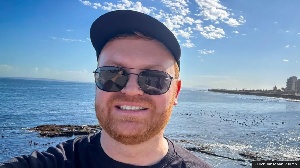- Home - News
- Elections 2024
- News Archive
- Crime & Punishment
- Politics
- Regional
- Editorial
- Health
- Ghanaians Abroad
- Tabloid
- Africa
- Religion
- Photo Archives
- Press Release
General News of Thursday, 15 May 2025
Source: www.ghanawebbers.com
Do Afrikaners want to take Trump up on his South African refugee offer?
Ulrich Janse van Vuuren is passionate about showcasing South Africa. The 38-year-old shares beautiful snapshots of his country on social media. He captures scenes like Johannesburg mornings and Pretoria's Jacaranda trees. "Promoting South Africa is my passion," he told the BBC. He has no plans to leave for the US.
Recently, a small group of white South Africans left for the US as refugees. They were encouraged by President Donald Trump and Elon Musk. They claim that white Afrikaners face persecution in South Africa, calling it "genocide." This claim has been widely discredited over the years.
While some white farmers have faced violence, crime affects all South Africans. The country has one of the highest murder rates globally. "For me, South Africa is home," said Mr. Janse van Vuuren. He feels deeply invested in its success and proud of its journey.
He wished those who left well but called them "opportunists." He believes they enjoyed privileges in South Africa and are not fleeing persecution. After apartheid ended 30 years ago, living standards for whites remain higher than for blacks.
Mr. Janse van Vuuren feels more determined to contribute to his country now. Most Afrikaners see themselves as fully African after four centuries in South Africa. However, many are unhappy with high crime rates and government policies on land reform.
A new law allows the government to seize land without compensation if deemed just and equitable. White South Africans make up 7% of the population but own half of the farmland. Some Afrikaners view this law as targeting them specifically.
Trump's comments about resettling Afrikaner refugees have stirred political debate in America. Despite claims of systematic targeting, local crime statistics tell a different story. Between October and December 2024, there were 6,953 murders in South Africa; only 12 were farm attacks.
On Monday, a group of 59 Afrikaners arrived at Dulles Airport near Washington DC after leaving South Africa. Their arrival sparked outrage among many back home who dispute claims of persecution against whites. President Cyril Ramaphosa criticized their departure as a "cowardly act."
He stated they are leaving because they resist changes in society and governance. Many agree with him, including Mr. Janse van Vuuren, who values his heritage deeply.
Although he isn't from a farming background, he knows farmers affected by crime firsthand. While some farmers face real threats, he urges caution when discussing claims of widespread persecution or systemic oppression.
Some white South Africans feel persecuted despite differing views within their community. Ilse Steenkamp applied for refugee status but hasn't received feedback yet due to her family's recent struggles as commercial farmers.
She described losing their land after it was invaded before selling it off to downsize their operations post-apartheid era—destruction made selling impossible despite legal efforts to remove invaders from their property.
Ms Steenkamp found leaving difficult because it meant abandoning her way of life but felt compelled by circumstances beyond her control—she disagrees with criticisms regarding refugee status amid broader immigration crackdowns elsewhere.
Sam Busà also applied for refugee status through Amerikaners—a platform aiding interested white South Africans seeking resettlement offers from Trump’s administration—though she hasn’t been interviewed yet either despite submitting applications alongside her sons recently.
Initially thought limited only to Afrikaners under vague executive orders targeting whites specifically; Ms Busà argues these policies affect all white citizens facing similar challenges regardless of ethnicity or descent backgrounds alike!
The US embassy clarified criteria for applicants needing proof showing genuine threats exist before granting resettlement opportunities while responding critically towards accusations labeling them non-refugees altogether!
Dr Piet Croucamp disagrees with this perspective stating that “South Africa does not persecute people.” Instead suggesting victims may define existence based solely upon insecurity stemming from criminal activity rather than systemic oppression experienced collectively across racial lines throughout history itself!
Despite ongoing criticism directed toward government policies affecting communities disproportionately represented within society today; prominent groups like AfriForum reaffirm intentions remaining committed staying put working towards creating better futures locally instead!
Mr Janse van Vuuren echoed sentiments shared among many others choosing resilience over flight: “While some may choose to leave as refugees,” he said confidently “the majority are here building brighter tomorrows together!”











